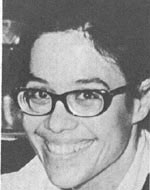Daughter of Arieh and Rachel. She was born on 14 August 1939 in Hadera, two weeks before the outbreak of the Second World War. When she was two years old, they would carry her to the bomb shelter in Haifa. She was three when she insisted on joining her brother and her sister in a kindergarten. After spending two years in kindergarten, she received a certificate, which reads: “Beautifully handing her thoughts, curious to turn her, quick-grasping, knowing how to persevere in her desire, with a very developed aesthetic sense.” Nora completed her studies at the Heil Elementary School in Bat-Galim and continued her studies at the Ironi H High School in Tel Aviv, in a humanistic direction. At school, she was a diligent student who was very meticulous about cleanliness and cleanliness, as well as the clarity of her thought and manner of expression. Even then she had the will and willingness to help others. Everyone knew her as a kind and very friendly girl, who made friendships with those around her. Her friends and friends felt that the relationship with Nora was based on sincerity and mutual understanding, and therefore she felt love, respect and appreciation. Nora had many hobbies, such as listening to classical music, reading, touring museums and watching theater. Her vision and understanding of art were interpreted in many areas – she valued any art that was not superficial, hypocritical, or artificial. Nora was drafted into the IDF at the beginning of September 1957. After completing her basic training, she completed her course with honors and was assigned to the unit with seven other soldiers of the Signal Corps, in the harsh climatic conditions and unusual working conditions. After a short time, she was sent to a wireless training course and was again very successful, and her commanders appreciated her and were pleased with her work, so they recommended her to be promoted to Corporal. In September 1959, she was discharged from regular service in the IDF and assigned to a reserve unit of the Israel Defense Forces, and when she left for civilian life she faced the problem of what direction would she go? Despite her love for the profession, she did not agree with some of the teaching methods and teaching methods, and did not hesitate to express her opinion – as a representative of her class – at the closing ceremony attended by Lt.-Gen. The Minister of Health and the Executive Committee, and despite her chutzpah, she was elected to fill the only vacant position in the rehabilitation center of Hadassah Hospital in Jerusalem, who was told about Nora at the same time: “Nora loved the patients and wanted to give each of her best talents and knowledge. She did not hesitate to consult doctors in doubt. Many times I had to run to finish her work, because she would stay with the patients even after work hours. Lenora had the ability to organize. She understood the importance of keeping records of the patients’ condition and carefully updated their cards. So we could find years later an old patient’s card, written with great precision, by Nora, of course. “The patients felt a great love for her and appreciated her concern for them: When one of the patients was forced to leave his apartment because of his physical limitations, She drove the patient to see his new apartment, and after two years at Hadassah Hospital she went on to study at the State Orthopedic Hospital in England, and after a few months she fulfilled her dream of working at Stok-Mandebil, She gained considerable experience, connected friendships with colleagues and patients, and continued to do so after her return to Israel . Six-Day War brought her down. She stated simply: “I return from”When she returned from England, she returned to work at Hadassah Hospital in Jerusalem, where she was received warmly and happily, and a friend who shared her apartment told her:” It was a pleasure to live with her. She was so thoughtful, patient and understanding. And when I needed her help, there was no limit to her willingness. She was an interesting conversationalist, knowledgeable and broad-minded. Many Arabs have been through us in debates and conversations, and she has always been the center and the living spirit and has stood out in the depth of her knowledge and her views. You rarely meet a perfect person, and few are these people. For me, Nora was one of them. “After four years of work at Hadassah, she was appointed head of the physiology department at the Head and Spine Division at Tel Hashomer Hospital, and was drafted into the permanent army with the rank of captain. Nine months of advanced training in the most important rehabilitation centers in the United States. She returned to Israel on the eve of the Yom Kippur War and with the outbreak of the war she immediately began her daily work with the war wounded in her department at Tel Hashomer, with the devotion and loyalty she had always enjoyed. Because her knowledge was profound and extensive and she was known for her talent and experience, experienced and inexperienced physiotherapists sought her help. They did not hesitate to visit her in the ward or search her house for advice and guidance, and Nora was always ready to help. On May 31, 1974, Nora was seriously injured in a road accident on her way to Jerusalem, and due to severe damage to the spine, she remained paralyzed. Her friends sat beside her day and night, and she instructed them how to handle her. Everyone thought that she would soon return to work in a wheelchair, but it did not happen. On the 28th of Sivan 5740 (18.6.1974), Nora fell in the line of duty. Was laid to rest in the military cemetery on Mount Herzl in Jerusalem. Survived by her parents, brother and sister. ation,
